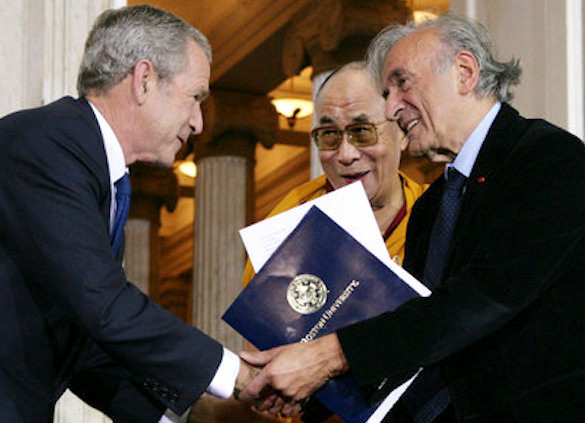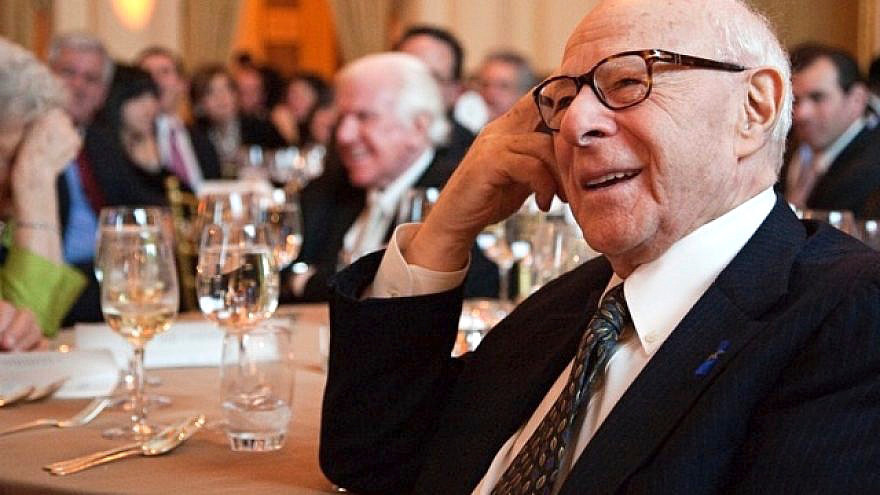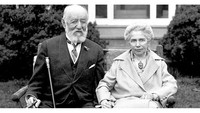Israel salutes America: 70 who counted in 70
On the occasion of the Jewish state’s 70th anniversary, the Israeli embassy in Washington, in partnership with the Jewish News Syndicate, celebrates 70 of the greatest American contributors to the U.S.-Israel relationship
Many of the people and organizations chosen for this acknowledgement will be readily recognized by readers of The Jewish Star, others less so, but their powerful stories build a collective history that reflects the broad base of American love and support for the Jewish state.
This week, The Jewish Star publishes the fifth part of a series that will cover all of the “70 who counted.”
Link here to all 9 installments:
Ben Hecht (1894–1964) 35 of 70
Ben Hecht, a prolific journalist, novelist and playwright, was one of Hollywood’s most sought-out and successful screenwriters.
Hecht’s life took a sharp turn in 1941 when he met Peter Bergson, a central figure in the history of Zionism. Born Hillel Kook (nephew of the famed Rabbi Abraham Isaac Kook), Bergson was a founding member of the Irgun. He convinced Hecht to fight for the goals of the network, at this point mainly the rescue of European Jews. Hecht realized that his connections in Hollywood and the press could be valuable to the cause.
Hecht began producing a number of full-page advertisements that brought the ongoing horrors of the Holocaust to public attention. One ad, published in 1943 in The New York Times read: “For Sale to Humanity — 70,000 Jews — Guaranteed Human Beings — at $50 a Piece,” referencing Romania’s offer to send Jews to safety if their travel expenses were paid upfront.
Next, Hecht utilized Hollywood connections to put together a massive pageant. Titled “We Will Never Die,” it was performed before 40,000 spectators at Madison Square Garden to spread awareness of the Holocaust and influence change in American immigration policy, which restricted the number of refugees allowed in.
After the war, Hecht focused his Jewish activism on supporting the Irgun’s activities, which included smuggling weapons and immigrants to British-controlled Palestine. He openly supported the Jewish underground, using speeches, writing and his international contacts to help influence public opinion toward the establishment of a Jewish state in Palestine.
In an extraordinary fundraising speech, Hecht spoke to a group of Jewish mob bosses, whom he described as “a thousand bookies, ex-prize fighters, gamblers, jockeys and all sorts of lawless and semi-lawless characters,” and beseeched them: “A David stands against Goliath. I ask you Jews — buy him a stone for his slingshot.” The speech allegedly yielded almost a quarter of a million dollars in donations for the Irgun.
In 1947, Hecht wrote the script for a play, A Flag is Born, starring a young Marlon Brando. The play proved extremely popular on Broadway and its national tour, raising more than $400,000 toward purchasing a ship that was used in an attempt to smuggle more than 900 Holocaust survivors to Palestine. The ship was renamed the SS Ben Hecht in honor of Hecht’s major contribution.
Hecht’s story is a powerful tale of an American Jew who used his unique combination of talents, skills and contacts to help the Jewish people and the Jewish state.
Elie Wiesel (1928–2016) 36 of 70
Elie Wiesel was great not because of his talent as a writer or his wisdom as a thinker. He was great not because of his character, which combined the dignity of nobility with the humility of deep faith. Elie Wiesel was certainly all of these things, but what made him truly great was the virtue that makes all others possible: courage.
Elie Wiesel possessed the courage to speak truth to power. He told President Ronald Reagan not to go to Bitburg, Germany; pleaded with President Bill Clinton to act against genocide in Bosnia; and opposed President Barack Obama’s nuclear deal with Iran. An author, Nobel Peace Prize laureate and the world’s most famous Holocaust survivor, Wiesel brought recognition of those horrors to the world.
His writings, especially Night, inspire millions with stories of strength and perseverance.
Wiesel believed that after the Holocaust, the State of Israel became critical to Jewish identity and survival. As he put it, “It’s clear … that one can’t be Jewish without Israel.” He forcefully defended Israel in writing and in his speeches. In his Nobel lecture in 1986, Wiesel proclaimed Israel’s intrinsic connection to Jewish peoplehood. “I trust Israel,” he said, “for I have faith in the Jewish people. Let Israel be given a chance, let hatred and danger be removed from her horizons, and there will be peace in and around the Holy Land.”
His philosophy — recognizing the Holocaust as a fundamental component of modern Jewish identity — did not win immediate acceptance in Israel. For some time, Israeli society did not embrace the full narrative of the Holocaust, preferring to focus instead on isolated instances of resistance, such as the Warsaw Ghetto Uprising. With time, and with the absorption of large numbers of immigrants who had lost family members in the Holocaust, Israelis came increasingly to appreciate Wiesel’s writings. He made such a powerful impression on Israeli society that he was offered the Israeli presidency by both Ehud Olmert and Benjamin Netanyahu; he declined both times.
Despite living outside of Israel, during times of war and conflict, Elie Wiesel was on the front lines of Israel advocacy. During “Operation Protective Edge” in 2014, he appeared in advertisements in some of the most popular newspapers in the United States, denouncing Hamas’s use of children as human shields. In March 2015, Wiesel attended Prime Minister Netanyahu’s speech to the U.S. Congress, lending his moral authority to those who opposed the nuclear deal with Iran — a regime that denies the Holocaust and threatens Israel with annihilation.
Elie Wiesel was a man of the world and a man of his people; he understood that the two go hand in hand. Never accepting a separation between the State of Israel and the Jewish people, Wiesel believed fervently in both.
Tom Lantos (1928–2008) 37 of 70
Tom Lantos’s mother was one of 440,000 Hungarian Jews killed by the Nazis. Lantos joined the underground and survived. But when he learned of her death, he was not embittered. He remained positive, enabling him to befriend people of all backgrounds and views. “[Lantos],” remarked his friend Elie Wiesel, “saw his survival from the camps in Europe as a reason to devote his life to help victims of discrimination, oppression and persecution everywhere.”
Born and raised in Budapest, Lantos came to the United States following the war. He excelled academically, earning a doctorate in economics from the University of California, Berkeley. He kept his Old World courtliness and never had a desk in his office, not wishing anything to come between him and his visitors.
Lantos led a 27-year career as a Democratic Congressman from California and chair of the House Foreign Affairs Committee, characterized by a commitment to safeguarding human rights, and defending the Jewish people and Jewish state.
The only Holocaust survivor elected to Congress, his first act was to introduce legislation to honor Raoul Wallenberg, the Swedish diplomat who rescued thousands of Hungarian Jews during World War II. Lantos was actively engaged in the cause of Soviet Jewry and organized the Congressional Human Rights Commission, a group since renamed in his honor, to help those fighting for freedom and expose the atrocities of their foes. The 2004 law named after him, the Lantos Amendment, requires the State Department to regularly report on anti-Semitism as a worldwide phenomenon and threat.
When it came to Israel, the view of Tom Lantos carried weight in Congress. When countries in the Middle East threatened Israel, Lantos always spoke out. When he felt that Egypt’s government was not doing enough to stop the smuggling of weapons to Hamas, he suggested ending aid to Egypt and questioned funding to Lebanon, noting that its unwillingness to defend its borders allows Syria and Iran to finance, arm and train Hezbollah.
One of his colleagues, Democratic Sen. and vice presidential candidate Joe Lieberman, said: “[Tom Lantos] embodied the bipartisan support that Israel so rightly enjoys in America. In the history of the Jewish state, Israel had no better friend in Congress.”
The Crown Family 38 of 70
“Support Israel in every way you possibly can. Get people to understand Israel’s tremendous contributions to humanity,” said Lester Crown in a 2015 interview.
In outlining his devotion to Israel, Crown was not merely expressing a personal preference, but a long and distinguished family tradition of engagement and principled commitment to the Jewish state.
Lester’s mother, Rebecca, was active in Hadassah; his father, Henry, spent the 1930s trying to get Jews out of Germany and would later lobby for the creation of a Jewish state. After the establishment of Israel, the nation was hampered in its ability to purchase military equipment, so Teddy Kollek, later mayor of Jerusalem, asked Henry Crown to ship parts for airplane equipment to Israel. Crown’s contributions helped found Israel’s domestic jet production industry.
Throughout their lives, Henry and Rebecca were pillars of Zionism and philanthropy in Chicago.
While leading Henry Crown and Company in Chicago, Lester Crown has maintained the family’s proud legacy; the Crown Family Foundation has supported educational programs about Israel in America, as well as research institutions in Israel. The family endows a chair in Israel Studies at Northwestern University and supports the Crown Center for Middle East Studies at Brandeis, promoting desperately needed Israel studies in American academies.
Convinced that economic development in Arab states and Palestinian areas could in the long run prove more valuable for peace than politics — however important peace negotiations may be — Lester Crown has fostered economic development in Palestinian areas and elsewhere, creating new business ties between Israelis and Arabs. These efforts have deepened economic ties throughout the region and worked to facilitate coexistence.
In profound ways, the Crown family has enabled Israel to be a great contributor to the human story.
Norman Podhoretz 39 of 70
Norman Podhoretz first traveled to Israel in 1950, when he was 20. He visited a cousin who decided to honor his relative from America by saving two eggs and serving them soft-boiled. Podhoretz, who loathed soft-boiled eggs, ate them with a smile.
In the decades that followed, Podhoretz’s commitment to Israel would remain unflagging, best expressed in his 35-year stewardship of Commentary magazine. A publication of the American Jewish Committee, Commentary had not especially concerned itself with Israel in its first 15 years of existence. From 1960 until his retirement in 1995, Podhoretz directed the magazine’s intellectual and creative energies in large part towards the defense of the Zionist experiment and the existential necessity of a Jewish state.
This was true not only when Israel came under physical attack, but when it came under rhetorical and polemical attack from the United Nations, the Arab world and elite opinion in the West. He saw Israel’s fate as inseparable from that of Western civilization, and sought to demonstrate how they were interwoven. As a writer, he frequently addressed the threat posed by the assaults on Israel, notably in a 1982 article titled “J’Accuse!”
Podhoretz, 88, knew this in his marrow. The child of Galician immigrants, he grew up the son of a milkman in one of New York City’s poorest neighborhoods. He excelled academically, and went to Columbia University and Cambridge University on scholarships. After serving in the U.S. Army, he joined the circle of New York intellectuals he famously dubbed “The Family” and took over Commentary in 1960.
He later broke with many in his intellectual circles, in part due to their hesitation to support Israel during and after the 1967 Six-Day War, and in part due to their reluctance to criticize anti-Semitism during a New York City public school strike in 1968. These events and others led him to become one of the founding members of the “neoconservative” movement, which saw the defense of the West and democratic institutions — including Israel — as a noble and heroic cause.
His 12 books range widely from political analysis to literary criticism to social autobiography. His contributions to intellectual support for Israel and a strong U.S.-Israel alliance have been immense.
Nathan (1848–1931) and
Lina Straus (1849–1912) 40 of 70
Born to a Jewish family in Bavaria in 1848, Nathan Straus, along with his brother Isidor, sold products to Macy’s, eventually becoming co-owners of the famed retail institution. Deeply committed to improving health care and general wellbeing, especially among the poor, Nathan used his considerable wealth and political connections to fund many health-related initiatives, including the fight against childhood diseases and tuberculosis.
Although Straus did not lead a particularly religious life, when he and his wife, Lina Gutherz Straus, visited Ottoman-controlled Palestine in 1904, they were powerfully moved by their visit, experiencing “a strange and intense desire to return.” They became ideologically committed Zionists, and began a long campaign of philanthropy in British Mandate Palestine. Over the next two decades, Straus made substantial contributions to a number of large projects for improving health care, sanitation and education in the yishuv. The Strauses also built pasteurization plants, soup kitchens and employment centers.
In 1912, tragedy struck the Straus family. Nathan, Isidor and their wives had traveled to Europe to attend an international tuberculosis conference in Rome. Afterward, Isidor and his wife, Ida, returned on the Titanic. As the ship sank, precious spots on a lifeboat were offered to the Strauses, likely due to their advanced age and fortune. Isidor, recognizing that there were not enough lifeboats to save everyone aboard, refused. Ida refused to part with her husband. Sadly, both went down with the ship.
Legend has it that Nathan and Lina were to return to the United States aboard the Titanic as well, but fortuitously had decided to spend the remainder of their spring in Palestine. Following the death of his brother and sister-in-law, Nathan dedicated even more of his time and wealth towards philanthropy for Zionist causes.
Nathan’s commitment to the development of Jewish institutions and communities in pre-state Israel continued through the end of his life. Upon his death, he left two-thirds of his estate to Jewish institutions in Palestine. A tiny new Jewish town on the Mediterranean coast was named in his honor, now the bustling, prosperous and growing city of Netanya.
Robert Kraft and Myra Hiatt Kraft (1942–2011) 41 of 70
On Nov. 23, 2015, before kicking off their game against the Buffalo Bills, the New England Patriots observed a moment of silence in memory of Ezra Schwartz, an American yeshiva student who had been murdered in a terrorist attack while studying in Israel. Why? The answer is simple: Robert and Myra Hiatt Kraft.
Robert Kraft was born in Brookline, Mass., in 1941; Myra Hiatt was born 35 miles away in Worcester the next year. He was raised in a Sabbath-observant Jewish household; she was born to Lithuanian Jewish immigrants. The couple met in Boston and married in 1963, the same year Bob graduated from Columbia University and the year before Myra graduated from Brandeis. They spent their honeymoon in Israel.
After college, Bob entered the world of business, where he proved wildly successful. He built up a veritable business empire, and in 1994, purchased the New England Patriots, who have since sold out every home game and won five Super Bowls.
Myra led the couple’s philanthropic endeavors. The Kraft family is well-known for their charity, donating more than $400 million to a variety of causes relating to education, health and culture. Faithful to their Jewish roots, the Krafts maintained a focus on initiatives that foster ties to Jewish identity and Israel. They have generously donated to American Jewish organizations, in addition to launching the “Passport to Israel” program, affording Boston’s Jewish high school students the opportunity to visit the Jewish state. Together with Myra’s father, Jacob Hiatt, the Krafts funded two joint comparative religion professorships between Brandeis University and College of the Holy Cross to promote greater understanding between Christians and Jews. In Israel, the Krafts also helped develop a sister city relationship between Haifa and Boston, and have donated towards the absorption of Ethiopian immigrants.
The Krafts have worked to bring American football to the Jewish state. “My late, darling wife Myra always used to tell me that until I start building football in Israel, I would not win anything with the Patriots. That happened in late 1999, and we won our first Super Bowl in 2001. Now we have five championships, and I can’t ignore the connection,” Bob said.
He has led NFL players on trips to Israel for many years, but none more inspiring than in 2015, when for the first time, he led a delegation of 19 Hall of Famers on a historic trip called “Touchdown in Israel.” Two years later, he brought a second delegation of Hall of Famers, including NFL legends Jim Brown and Joe Montana. Highlights of the emotional and spiritual trips were featured in CBS Sports and NFL Films documentaries viewed by millions.
The Krafts funded Israel’s first women’s flag football league, as well as the Kraft Family Sports Campus in Jerusalem, the first and only standardized American football field in Israel.
Although Myra passed away in 2011, the Kraft family continues to be a pillar of Jewish philanthropy. In his commitment to strengthening Jewish identity and the Jewish state, Bob continues the legacy of this remarkable couple.











